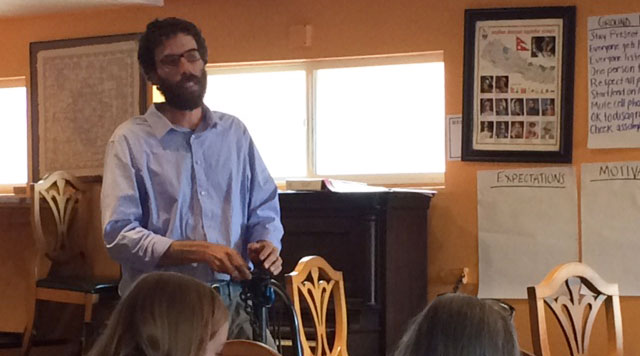This week, we caught up with Stephen LeFaiver, executive director of Teens, Inc., which is based in Nederland, Colorado. Stephen has led Teens, Inc. since 2005.
1. Tell us about you and your organization and the social change you are trying to achieve.
“The mission of Teens, Inc. is to support, educate and empower youth and their families to make healthy choices and to thrive. At the heart of this are our core values: believing in and promoting youth voices, having an unending belief in the possibilities of young people, building strong relationships, and honesty and integrity. The social change we are attempting to make is to shift the way that people view young people or teens—to see them as a resource, not as a problem to be fixed. This is true for all sorts of youth: from youth who are incarcerated, to youth who may be struggling in school, to youth who are doing just fine in school but still may not be viewed as a resource or as someone who the community can support.
“We just had our graduation for Chinook West, our school in Nederland, Colorado. Chinook West is a school for kids who, for one reason or another, had not succeeded in a traditional school setting. At Chinook, we focus on creating an environment where the youth want to be. Youth at this age are able to make their own decisions, so if we can create an environment where they want to be and want to be challenged, then they will come. At graduation, we had one particular student named Josh who spoke so eloquently about the love of learning that has been reinvigorated in him through attending Chinook. The school and all our programs are founded on this unending belief that every person can overcome their challenges and be supported, and develop a plan and grow.”
2. What keeps you inspired and going when things get tough?
“For me, it’s the staff that we work with. We all deeply share that core value of believing in possibilities: we won’t give up, we’ll keep working, we’re a supportive and collaborative staff that communicates well, and we provide that support network for each other. That kind of dedication inspires me.”
3. What advice would you give to someone who is trying to break new ground in a traditional field?
“My advice would be to keep that optimistic outlook, to keep in mind that there is always potential for positive change, and not to lose sight of that. Also, I’d advise to really invest in the folks that you work with by developing those strong relationships and those high expectations and values that you can always lean on when things are tough.”
4. What book do you recommend to everyone you meet and why? OR What book is on your to-read list and why?
“Unfortunately with my work life and two young kids, reading a book is kind of like a fantasy of mine. I do get to read articles because they’re less of a time commitment. One article I read recently that I found very valuable is by Jim Collins about your core ideology and core values, called ‘Good to Great’ (there is also a book by him of the same title). I also recommend his article, ‘Built to Last: Successful Habits of Visionary Companies.’ His work was very influential to how we developed our own core values at Teens, Inc.”
5. How have you worked with JVA, and how has that helped your organization?
“JVA has facilitated three strategic planning processes for us and helped us undertake a mission statement revision. Those processes have been invaluable to help us determine what we are shooting for and how we can further our impact. They also did a board development session with our partners—so we’ve also taken advantage of some of the trainings provided through JVA, as well.”
6. What else would you want to share with us that we haven’t asked?
“I’d like to challenge other organizations to be strategic and shoot for loftier goals. Something I think Teens, Inc. has done really well is to challenge and promote our staff with benefits and salaries that we hope are competitive—understanding that our staff is our most valuable group and that quality relationships are essential for the work we do to be successful. We realize we have to put resources into our staff and offer benefits, wages, professional development opportunities, etc. so staff feel valued and want to continue to work for us. I want to challenge other organizations out there to reflect on and consider those issues for themselves.”







Leave A Comment